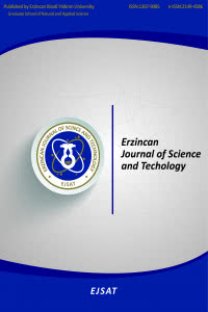Referans Parametreleri ile Biçimlendirilmiş Kavram Latislerinin Bilgisayarlı Gerçekleştirimi
Biçimsel Kavram Analizi, Tematik İlişkiler, Biçimsel Ontoloji
Computerized Implementation of Concept Lattices Formed with Reference Parameters
___
- Barwise, J., Perry, J. (1983). Situations and Attitudes, MIT Press, Cambridge, MA.
- Butt, M. (2005). Theories of Case. Cambridge, Cambridge University Press.
- Croft, W. (1991). Syntactic Categories and Grammatical Relations, Chicago/London: University of Chicago Press.
- Dowty, D. 1991. Thematic Proto-Roles and Argument Selection, Language, vol. 67, no. 3, s. 547-619.
- Fırat, Y., Kılıçaslan, Y., Uçar, Ö. 2013. Bilgisayar Ortamında Biçimsel Ontoloji Oluşturulması, Yükseköğretim ve Bilim Dergisi/Journal of Higher Education and Science, vol. 3, no. 1, s. 80-84.
- Fırat, Y., Uçar, Ö., Kılıçaslan, Y. 2014. Semantic Analysis with a Lattice-Based FrameNet, Journal of International Scientific Publications:Language, Individual & Society, vol. 8, Bulgaria, s. 512-518.
- Fillmore, C. J., "Frame semantics and the nature of language". In Annals of the New York Academy of Sciences: Conference on the Origin and Development of Language and Speech, Vol. 280, s. 20-32, 1976.
- Foley, W. A., Van Valin, R. D. jr. (1984). Functional Syntax and Universal Grammar, Cambridge University Press, Cambridge.
- Ganter, B., Wille, R. (1999). Formal Concept Analysis Mathematical Foundation, Berlin: Springer, Verlag.
- Gruber, J. (1965). Studies in Lexical Relations, MIT Dissertation, Bloomington: Indiana University Linguistics Club, [Reprint 1970].
- Jackendoff, R. (1972). Semantic Interpretation in Generative Grammar, Cambridge: MIT Press.
- Jackendoff, R. 1987. The Status of Thematic Relations in Linguistic Theory, Linguistic Inquiry, vol. 18, no. 3,s. 369-411.
- Jackendoff, R. 1993. On the Role of Conceptual Structure in Argument Selection, A Reply to Emonds, Natural Language and Linguistic Theory, vol.11, no.2, s. 279-312.
- Kasper, S. (2008). A comparison of ‘thematic role’ theories. Unpublished master thesis, The Philips University of Malburg.
- Kılıçaslan, Y., Uçar, Ö., Özkan, Y., 2012. FrameNet Tekniği ile İki Dilli Ontoloji Hizalaması, NWSA-Engineering Sciences, vol. 7, no. 2, s. 505-520.
- Kılıçaslan, Y., Tuna, G., 2015. Linking FrameNet and Natural Languages via Thematic Role Structures, International Journal of Languages, Literature and Linguistics, Vol. 1, No. 3, s. 158-163.
- Levin, B. (2009). Lexical Semantics of Verbs, Course LSA 116, LSA Linguistic Institute, University of California, Berkeley.
- Wille, R. (1982). Restructuring lattice theory: An approach based on hierarchies on concepts. ed. (I. Rival), in Ordered Sets, s. 445-470, Dordrecht-Boston: D. Reidel Publishing Company.
- ISSN: 1307-9085
- Yayın Aralığı: 3
- Başlangıç: 2008
- Yayıncı: Erzincan Binali Yıldırım Üniversitesi, Fen Bilimleri Enstitüsü
Sun Drying of Cornelian Cherry Fruits (Cornus mas.L)
Ayşe Vildan BEŞE, Bilgehan POLATOĞLU
Elmalı Baraj Gölü (İstanbul, Türkiye) Fitoplanktonik Alg Florası
Zülfiye İLTER, Ferhat ALHANLI, Serpil YILMAZ
Kültür Bitkilerinde Apomiksi Genlerinin Klonlanması
Anadolu Geleneksel Tıbbında Güneş Çarpması ve Güneş Yanığı Tedavisinde Kullanılan Tıbbi Bitkiler
Üleksitin Kurutulmasında Farklı Isıtıcıların Verimliliğinin İncelenmesi
Mehmet Faruk ESKİBALCI, Onur Veysel IŞIKTAŞ
İnce Düzlemlerde Yayılan Ultrason Dalgası Kullanılarak Hedef Uzaklığının Kestirilmesi
Tuğba Özge ONUR, Johan E. CARLSON, Erika SVANSTÖRM, Rıfat HACIOĞLU
Zülfiye İLTER, Ferhat ALHANLI, Serpil YILMAZ
Referans Parametreleri ile Biçimlendirilmiş Kavram Latislerinin Bilgisayarlı Gerçekleştirimi
